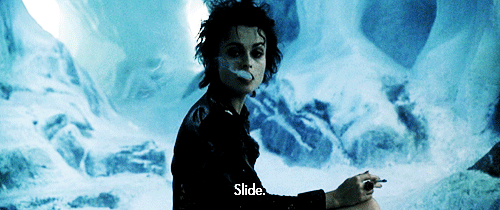
One of the most important scenes in David Fincher’s Fight Club[1] is when The Narrator meets his ‘power animal’ in the cave whilst in meditation. Although it’s only a very short sequence, the penguin represents changes we see in The Narrator’s character throughout the film, which are relevant to the dramatic plot twist near the end.
The Narrator is unhappy, with no friends and stuck in a job he hates. The penguin as his ‘power animal’ is symbolic of his life, as a penguin is trapped in the sense that it is unable to fly away from its problems. He sees himself as a penguin and the cave he pictures whilst meditating is cold and made of ice, depicting the isolation and lack of warmth in his life.
The penguin tells him to slide, essentially encouraging him to relax and let go of his insecurities, representing freedom. In a similar way to The Narrator’s character at this point in the film, penguins aren’t individual characters. They survive by working and living in packs, relying on each other to survive. By sliding away, The Narrator is able to escape from his dependency on other people and learn to express his individuality.
The colour of the penguin is important, as the contrast between the black and white in one single entity highlights the binary in The Narrator’s personality. The Narrator is shy and insecure, whilst his alter ego Tyler Durden represents everything that he isn’t – confident and carefree. Similarly, The Narrator is incredibly materialistic whilst Tyler lives in an abandoned house that is flooded and falling down. The juxtaposition of their two personalities, which are revealed to be part of the same person, is effectively symbolised by the contrasting colours of the penguin. The duality highlights the contradictory nature of The Narrator’s persona, whilst portraying a foreshadowing of the later revelation of the split personality.
When The Narrator is in his cave with his ‘power animal’, it is his happy place and it allows him to be free from his problems and express himself. He is also happy at his therapy groups because they allow him to pretend to be somebody else, but Marla’s presence means he is no longer able to. She becomes part of his subconscious and replaces the penguin in the cave as his ‘power animal’, imitating its words and telling him to slide. This encourages him to let go of what has been holding him back and allows him to express the hidden parts of his personality and become Tyler.

He sees himself as a penguin, but when Marla replaces it he doesn’t want her to be a representation of himself, so in order to establish himself as individual he slides away to become Tyler. Fincher’s use of the penguin provides a turning point in the film for The Narrator’s character. After a build up from the beginning of the film highlighting how depressing his life is, he is encouraged to change who he is, which allows him to progress and explore other aspects of his personality that he has been holding back.
[1]David Fincher, Fight Club (United States: 20th Century Fox, 1999).